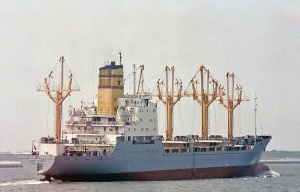The Ghana Merchant Navy Officers Association (GMNOA) has stated that the collapse of the Black Star Line was undesirable and needs to be revamped to boost industrialization.
Mr Pius Anani Dumashie, Vice Chairman GMNOA said the fleeting management company was the major backbone for the nation’s maritime sector from 1950s but collapsed later under the weight of bad management coupled with debt.
“The collapse of Black Star Line is something regrettable because that shouldn’t have been the case, basically the company run down was because the company was just carrying government cargo but was not being paid,” he stated.
Mr. Dumashie stated at the Ghana News Agency Tema Regional Office’s Industrial News Hub Boardroom Dialogue platform.
The GNA Tema Industrial News Hub Boardroom Dialogue is a media think-tank platform for state and non-state and commercial and business operators to communicate to the world.
Mr. Dumashie, a veteran seafarer mentioned that after the Black Star Line was formed, a training school known as Ghana Nautical College which had transformed into the Regional Maritime University was also established.
Its sole mandate was to train officers to run affairs of the Black Star Line and develop mass officers to ensure that Ghana takes advantage of the blue economy.
Mr. Dumashie indicated that, the company undertook extensive trading activities within the West African sub-region and subsequently to the entire world.
It generated a lot of revenue to the government, “we started with four ships and went as high as 20, but poor management decisions and abuse of the system resulted in its eventual collapse”.
Speaking on the role of “Merchant Navy as against Combat Navy,” Mr. Dumashie said the sector could be a leading source of employment saying that the country needed a new generation of ocean liners to advance the Gross Domestic Product (GDP) to catch up with developed societies.
The Vice Chairman GMNOA said the shipping lines could fill in the gab making huge monies from transporting cargo to and from Ghana adding that the nation’s industrialization agenda required the acquisition of shipping lines to facilitate the growth of the economy.
Captain Etoenyo Onassis Bankas, General Secretary of the GMNOA said the lack of a comprehensive maritime policy for Ghana made it difficult for investors to see the focus of the country in the sector and where to invest in.
He said: “Ghana needs that policy to give a platform for sea transport to thrive to promote the economy, shipping offers the cheapest cost of transporting goods from one place to the other, therefore if we can get people to invest into it, we stand a good chance of raking in more revenue.”
Mr Francis Ameyibor, Tema Regional Manager on his part, said journalists needed to take steps to report on the blue economy, which was an emerging concept that encouraged better stewardship of the ocean or ‘blue’ resources.
He said: “As the industrial new hub, we found the need to engage those in the industry on national issues to educate the public; and we have therefore created a platform for industrial players to use, for other stakeholders to reach out in a proactive means, while serving as grounds to address national issues.”
Source: GNA
 Home Of Ghana News Ghana News, Entertainment And More
Home Of Ghana News Ghana News, Entertainment And More





